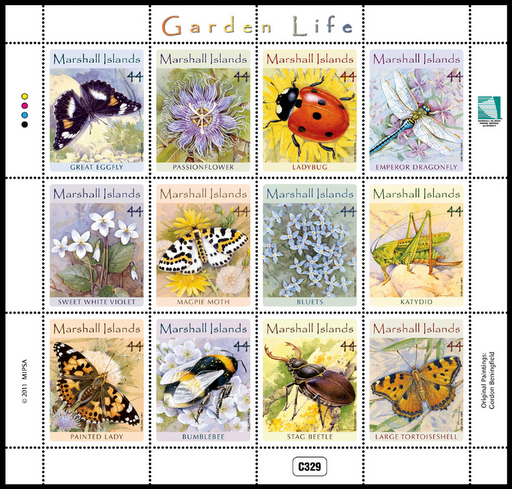We grow flowers in our gardens for our own enjoyment. But colour and perfume are really the plants’ way of advertising themselves to insects. Sweet nectar and protein-rich pollen are bait to encourage insects to visit. In return, pollen is carried from one flower to another on their bodies so the flowers are fertilised. Bees are among the most beneficial insects for a garden. The best way to attract them to your garden is to provide them with some of their favourite plants such as lavender, foxgloves, rosemary, sunflowers and bluebells. Flowers with long narrow petal tubes, such as evening primrose and honeysuckle, are visited by moths and butterflies. Only their long tongues can reach deep down to the hidden nectar. Short-tongued insects include many families of flies and some moths. They can only reach nectar in flowers with short florets. Hoverflies, wasps, ladybirds, lacewings, ground beetles and centipedes are the gardener’s friends and will help control garden pests such as aphids and caterpillars. Insects such as spiders, mites, millipedes, sow bugs, ants, springtails and beetles inhabit the soil food web in the uppermost 2 to 8 inches of soil. They participate in decomposing plant and animal residue, cycling nutrients, creating soil structure and controlling the populations of other soil organisms, including harmful crop pests. Decaying organic matter in soil is the source of energy and nutrients for garden vegetables and ornamental plants. By growing flowers attractive to a range of insects, our gardens can also become important feeding stations for bats, hedgehogs, birds and other wildlife. The most important factor when encouraging wildlife into your garden is not to use insecticides.
Most bats rely more heavily on flies as food than any other insect group. Pipistrelles, the bats most likely to visit your garden, depend on catching very large numbers of tiny insects. Hedgehogs are among the most beneficial of creatures to have in your garden as well as being a joy to encounter. They eat loads of pests including slugs, snails, caterpillars, beetles and other insects. The Cheshire Wildlife Trust’s tips for creating a hedgehog friendly garden include having dense shrub boarders, which offer shelter, and letting an area of bramble in quiet corner overflow, which slightly mimics hedgerows, naturally the perfect habitat for hedgehogs. Creating a small hole of around 15cm in fences and walls will allow hedgehogs access.
If you want to encourage frogs and toads into your garden you will need to provide some kind of pond. Frogs and toads both eat slugs, snails, insects and worms.
The most important factor when encouraging wildlife into your garden is not to use insecticides. Not only do they kill horticultural pests, but also those insects beneficial to the garden such as the lace wings, honey bees, hoverflies, and lady birds. This is terribly foolish as these insects are the natural predators of aphids, which after slugs are considered to be the most problematic of all the garden pests. The relatively recent and increased use of persistent neonicotinoid pesticides, known to be highly toxic to bees, may pose an increased threat. These and other pesticides may be translocated through plants into the nectar or pollen. In addition to insecticides, broad-spectrum herbicides used to control weeds can indirectly harm bees by removing the flowers that would otherwise provide the bees with pollen and nectar. Bumble bees require consistent sources of nectar, pollen, and nesting material during the adult activity period, and reduction of these resources by herbicides can cause a decline in bumble bee reproductive success and/or survival rates.
Sources:
Soil Insect Killers | eHow.com, 17 May 2011
http://www.ehow.com/info_8435820_soil-insect-killers.html#ixzz1hSegS2US
GARDENING FOR BATS, The Bat Conservation Trust, 15 Cloisters House
8 Battersea Park Road, London SW8 4BG (attached)
Some Useful Tips On Encouraging Wildlife Into Your Garden, 14 November 2011
http://www.wildlife-nannies.com/some-useful-tips-on-encouraging-wildlif…
The Garden of Eaden. 13 November 2008
http://gardenofeaden.blogspot.com/2008/11/decline-of-eating-insect-bird…
The New World Order Report
http://newworldorderreport.com/News/tabid/266/ID/6588/US-Bumble-bee-Pop…
The Runcorn and Widnes Weekly, June 23, 2011
http://www.runcornandwidnesweeklynews.co.uk/environment/runcorn-widnes-…

- Log in to post comments
